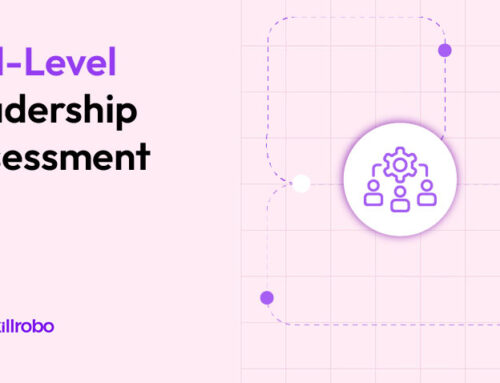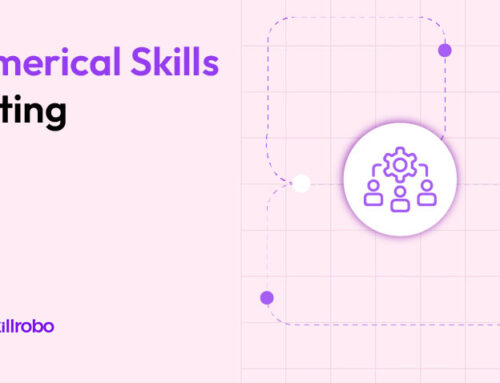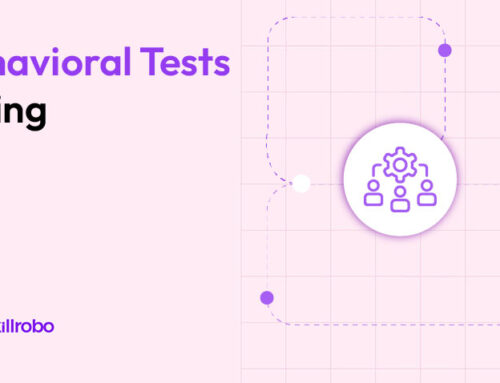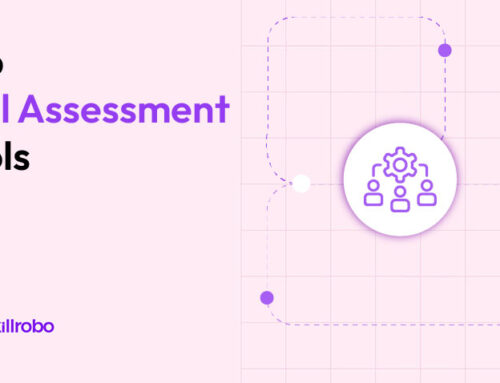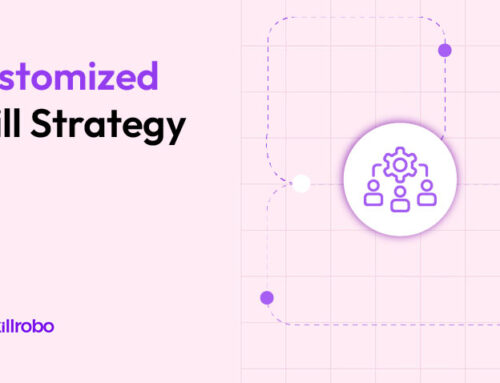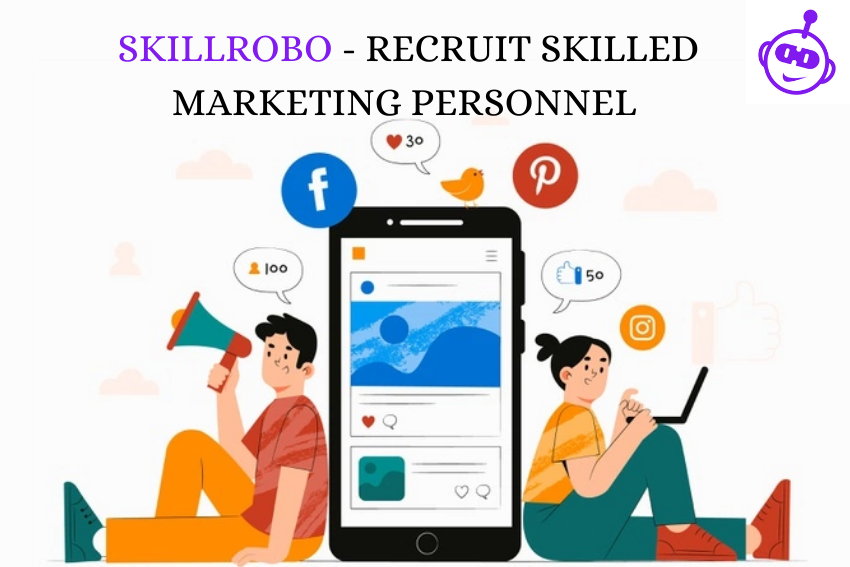
Key Takeaways
-
Marketing assessment tests deliver data-driven insights, helping employers accurately evaluate a candidate’s true skill levels before extending an offer.
-
Skill-based hiring reduces unconscious bias and guesswork by focusing only on job-relevant capabilities, ensuring a fairer recruitment process.
-
Custom marketing assessments allow recruiters to tailor tests for specific roles, helping identify candidates who demonstrate both strategic thinking and technical expertise.
-
Platforms like Skillrobo provide secure, customizable, and role-specific testing solutions, enabling organizations to streamline hiring and build stronger, high-performing marketing teams with confidence.
Why Modern Marketing Teams Need Smarter Hiring Tools
Hiring the right marketers is harder than ever. Between flashy portfolios, polished interviews, and inflated resumes, it’s easy to misjudge a candidate’s real potential. Traditional hiring methods—CVs, cover letters, and interviews—fall short in predicting how well someone will perform in a fast-moving marketing environment. Bad hires cost companies nearly 30% of the employee’s first-year earnings.
This is where marketing assessment tests come in. These pre-employment assessment tools give hiring managers an unbiased, measurable, and role-specific way to evaluate candidates. Whether you’re hiring for a content strategist, performance marketer, or digital campaign manager, assessment tests help you move beyond intuition to insight.
In the U.S., where marketing budgets are projected to grow by over 13% this year (source: Deloitte CMO Survey), teams can’t afford to make bad hires. A poor marketing hire doesn’t just cost time—it impacts campaign ROI, brand voice, and even customer trust. With pre-employment tests for marketing roles, organizations can prevent such risks early in the hiring process.
What Are Marketing Assessment Tests?
Marketing assessment tests are structured evaluations used to measure a candidate’s job-specific skills before they’re hired. These assessments are designed to reflect real-world marketing tasks and challenges, giving employers a reliable look into each candidate’s actual ability—not just their experience or personality.
Tests can cover a wide range of topics, including:
- SEO and SEM fundamentals
- Email marketing and email marketing automation platforms
- Content creation and copywriting
- Campaign strategy and ROI measurement
- Analytical tools like Google Analytics
- Soft skills like creativity, collaboration, and communication
Depending on the role, you may administer a digital marketing assessment test, a brand strategy simulation, or a combination of both. Platforms like Skillrobo let recruiters create online marketing skills tests tailored to job levels—from entry-level marketers to senior digital leads.
Why Marketing Assessment Tests Work
Today’s marketing roles demand both creative thinking and data literacy. It’s no longer enough for candidates to “talk strategy” in an interview—they must demonstrate fluency in tools, trends, and performance metrics. 77% of hiring managers believe skill assessments are as or more important than traditional hiring criteria like education or work history. Here’s why using marketing skills assessments can transform your recruitment process:
1. They Offer Role-Specific Insights
Instead of generic aptitude evaluations, you get to measure what matters—like how a candidate structures a landing page or writes ad copy. This is critical when choosing between candidates with similar resumes but vastly different skills.
2. They Reduce Hiring Bias
Since responses are scored automatically and anonymously, these tests remove subjectivity from early screening. According to the Equal Employment Opportunity Commission (EEOC), fair and consistent assessments reduce the risk of biased decisions.
3. They Save Time and Cost
By eliminating unqualified candidates early, marketing assessment tests reduce the time HR teams spend on interviews. This also lowers the chance of a costly hiring mistake.
4. They Help Predict Job Success
Candidates who score high on job-relevant assessments are more likely to perform well post-hire. In fact, companies using skill-based hiring methods report up to 39% better retention rates within the first year (source: Harvard Business Review).
Types of Marketing Assessment Tests
Marketing roles vary widely, and so should the assessments used to evaluate them. From content creation to data analysis, marketing assessment tests can be tailored to specific roles, helping recruiters accurately measure both creative and technical capabilities in candidates. Here’s a breakdown of the most common pre-employment tests for marketing roles and when to use them:
1. Digital Marketing Assessment Test
This test evaluates a candidate’s technical knowledge in areas like paid advertising, SEO, email marketing, and web analytics. It measures their ability to strategize, execute, and optimize campaigns across digital channels. Ideal for roles such as digital marketers, PPC specialists, and growth marketers who need to demonstrate strong familiarity with performance metrics and platform-specific tools.
2. Marketing Aptitude Test
Designed to assess foundational marketing knowledge, logical reasoning, and problem-solving ability. These tests are especially valuable for hiring fresh graduates or professionals switching careers into marketing. They help identify candidates with strong potential to grow into the role, even if they lack formal experience.
3. Copywriting & Content Test
This test measures a candidate’s ability to craft compelling, brand-aligned content across formats like emails, landing pages, blog posts, or social media captions. It evaluates clarity, tone, grammar, and creativity—key skills for content marketers, email marketing specialists, and social media professionals.
4. Analytical & Reporting Test
Focused on evaluating a candidate’s ability to interpret data, generate insights, and track marketing performance. It covers tools like Google Analytics, Excel, and CRM dashboards. Perfect for roles such as performance marketers, marketing analysts, and operations managers where data-driven decision-making is essential.
5. Behavioral and Personality Assessments
These are soft skills assessments that evaluate factors like communication, creativity, collaboration, and stress management. They offer insight into how candidates will interact within a team, handle feedback, and contribute to culture. Especially useful for roles requiring teamwork and client interaction, such as brand managers or campaign leads.
By mixing and matching these categories, you can build a marketing test for job candidates that’s accurate, relevant, and insightful.
Pros and Cons of Using Marketing Assessment Tests
While marketing assessment tests bring structure and data to the hiring process, they’re not without challenges. Understanding the advantages and limitations of these tools helps recruiters make better decisions and use assessments strategically in the overall recruitment workflow.
Pros –
- Objective Screening
Marketing assessment tests offer a standardized way to evaluate candidates based on measurable skills, reducing reliance on gut instinct or unconscious bias. This ensures a fairer hiring process where decisions are based on real capabilities, not just impressions during interviews.
- Faster Hiring
With automated scoring and clear benchmarks, recruiters can quickly filter out unqualified candidates and focus on top performers. This shortens the recruitment cycle and allows marketing teams to fill critical roles faster without compromising on quality.
- Better Cultural Fit
When paired with behavioral or personality assessments, marketing tests help assess whether a candidate aligns with your team’s values and communication style. This results in stronger collaboration, fewer conflicts, and a more cohesive work environment.
- Lower Turnover
Candidates who succeed in marketing assessments are more likely to have the skills and mindset required for the role. This leads to better job satisfaction, improved performance, and lower turnover—reducing the cost and disruption of frequent rehiring. Organizations that use pre-employment assessments see 24% higher employee performance and 39% lower turnover.
Cons –
- Incomplete Skill Coverage
Marketing assessment tests, while useful, often focus on specific technical or functional skills. They may overlook broader capabilities like creativity, emotional intelligence, or cross-functional collaboration, which are equally critical in real-world marketing roles. As a result, relying solely on test outcomes without evaluating softer skills can lead to an incomplete assessment of a candidate’s true potential.
- Risk of Test Fatigue
Lengthy or overly complex assessments can overwhelm candidates and lead to dropouts. This is especially true for senior marketers who may feel the process undervalues their experience. Short, focused tests are essential to maintain engagement.
- Potential Cheating
Without strong security measures, candidates might look up answers, get help, or manipulate the system. This is especially concerning for online, unsupervised tests. Platforms like Skillrobo address this with proctoring, timed questions, and randomization.
This is where choosing the right platform—like Skillrobo—matters.
How Skillrobo Enhances Marketing Assessments
Skillrobo is designed to simplify and strengthen the assessment process for marketing roles. Its customizable features, secure test environment, and built-in analytics allow recruiters to create meaningful, role-specific evaluations that deliver better candidate insights and reduce hiring risks.
- Customizable Tests: Create job-specific assessments for content, digital, branding, or analytics roles
- Built-in Anti-Cheating Tools: Use timer controls, randomized questions, and live proctoring
- Real-Time Analytics: Get actionable insights, score trends, and performance breakdowns
- Behavioral + Skill Assessments: Evaluate both hard skills and team compatibility in one platform
- Mobile-Friendly Testing: Make it easy for candidates to take tests from anywhere, securely
Whether you’re evaluating fresh talent or hiring a head of digital, Skillrobo’s online marketing skills test options are scalable, secure, and easy to use.
Real-World Use Case: How Marketing Assessments Saved a Costly Hire
A New York-based SaaS company once hired a content manager based solely on portfolio samples and interview charm. Within a month, the team realized the candidate lacked basic knowledge of funnel strategy, campaign pacing, and analytics. Campaign performance dipped 28%.
After implementing marketing assessment tests through Skillrobo, they began filtering candidates based on SEO writing, HubSpot experience, and funnel mapping. Their next hire not only improved campaign results but also boosted lead quality by 35%.
The difference? Measurable skills over assumptions.
Best Practices for Using Marketing Assessment Tests
Using marketing assessments effectively requires more than just selecting the right test. From customization to timing and feedback, following best practices ensures your assessments are relevant, engaging, and aligned with the skills your marketing team truly needs.
- Customize Assessments per Role
Avoid using generic assessments for all marketing positions. Instead, tailor the test to reflect the specific skills required for the role—whether it’s content strategy, SEO, paid campaigns, or data analysis. Role-specific tasks give you more accurate insights into how the candidate will perform on the job.
- Keep Tests Short and Focused
Long assessments can lead to candidate drop-off. Aim for tests that take 20–30 minutes to complete, focusing only on the most critical competencies. A concise, well-structured test increases completion rates and helps maintain candidate engagement throughout the hiring process.
- Align with Job Description
Every question or task in the assessment should directly relate to the responsibilities outlined in the job description. This ensures relevance and consistency while helping candidates better understand what will be expected of them in the role.
- Follow Up with Data-Driven Interviews
Don’t let the assessment results sit unused. Use them to structure interview questions, probe deeper into weak areas, or validate strengths. This creates a more meaningful interview experience and allows you to make informed, performance-based hiring decisions.
- Offer Feedback
Candidates appreciate transparency. Whether they move forward or not, share constructive feedback based on their test performance. This builds trust, enhances your employer brand, and leaves a positive impression that can lead to future engagement or referrals.
Final Words: Smarter Marketing Starts with Smarter Hiring
Marketing assessment tests are more than a filter—they’re a strategic asset. They help hiring managers move past surface impressions and focus on real skills, aligned with business goals. By integrating assessments into your recruitment workflow, you not only improve hiring accuracy but also build stronger, more capable marketing teams. Platforms like Skillrobo make it easy to customize tests, ensure test integrity, and make data-backed hiring decisions—all from one dashboard. Kickstart and empower your hiring process with Skillrobo. Sign up today!
FAQs
1. What are marketing assessment tests, and why are they important?
Marketing assessment tests are structured evaluations designed to measure a candidate’s skills in areas like digital marketing, content creation, analytics, and campaign management. They help employers make data-driven hiring decisions, reduce bias, and predict job success more accurately than traditional methods like resumes and interviews.
2. What skills can be evaluated through a marketing assessment test?
Marketing assessment tests can evaluate a wide range of skills, including SEO/SEM knowledge, content writing ability, data analysis, campaign strategy development, use of marketing automation tools, creativity, and communication skills. Tests can be customized to match the specific demands of each marketing role.
3. How do marketing assessment tests improve the hiring process?
By providing objective, role-specific insights, marketing assessment tests help hiring teams shortlist qualified candidates faster. They reduce reliance on gut feeling, improve the quality of hires, lower turnover rates, and help ensure that new hires can deliver strong marketing results from day one.
4. Are marketing assessment tests suitable for all types of marketing roles?
Yes. Whether you’re hiring content writers, digital marketers, performance analysts, or brand managers, marketing assessment tests can be customized to suit different skill sets and experience levels. Platforms like Skillrobo allow you to create targeted assessments that align closely with the role’s requirements.
5. How does Skillrobo ensure the integrity of online marketing assessment tests?
Skillrobo ensures secure and fair assessments through features like live proctoring, randomization of questions, timed sections, and automated scoring. This prevents cheating, maintains test integrity, and gives recruiters reliable results to make better hiring decisions.




